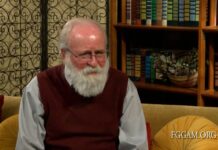70-years-old, he visited his friend William Worth one evening, ate some milk and bread, read out loud from the Bible, laid down on the floor to sleep and never woke up.

This was how
John Chapman, better known as
Johnny Appleseed, died on MARCH 18, 1845.

Johnny Appleseed’s father, Nathaniel Chapman, was a Minuteman who fought the British at Concord in 1775 and in the Continental Army under George Washington.

The apple originated in Central Asia and spread east to China, which is still the largest grower of apples in the world.

Alexander the Great saw apples in Central Asia.

He had some apples sent back to Macedonia in 328 BC, where they were cultivated and gradually spread across Europe.

In the 1600s, colonists brought apples to North America, with the first apple orchard being planted in 1625 by Rev. William Blaxton in Boston.

Johnny Appleseed collected seeds from apple cider presses in western Pennsylvania.

Johnny Appleseed may have spent time on Grant’s Hill in Pittsburgh, Pennsylvania in 1794 at the time of the Whiskey Rebellion.

He planted orchards and nurseries from the Alleghenies to central Ohio, West Virginia, Indiana, Illinois, giving thousands of seedlings to westward bound pioneers.

Johnny Appleseed lived nomadic life at harmony with Indians, bringing them medicinal plants.

Native Americans, even hostile ones, considered him touched by the Great Spirit, and became converted.

Johnny Appleseed stated:
“I have traveled more than 4,000 miles about this country, and I have never met with one single insolent Native American.”

During the War of 1812, Johnny Appleseed heard the British had incited an Indian attack, so he ran 30 miles from Mansfield to Mount Vernon, Ohio, to warn settlers.
 Get the book American Minute-Notable Events of American Significance Remembered on the Date They Occurred
Get the book American Minute-Notable Events of American Significance Remembered on the Date They Occurred
Bare foot, wearing a mush pan over his eccentric long hair and an old coffee sack over his shoulders, Johnny Appleseed had an unconventional and unique devotion to nature and the Bible.

Harper’s New Monthly Magazine printed a story of an itinerant missionary who exhorted in an open-air meeting in Mansfield, Ohio:
“Where now is there a man who, like the primitive Christians, is traveling to heaven barefooted and clad in coarse raiment?”

Johnny Appleseed walked up and put his bare foot on the stump the preacher had as a podium and said: “Here’s your primitive Christian!”

Johnny Appleseed called an apple blossom a “living sermon from God” and often quoted the Sermon on the Mount.

Poet William Henry Venable wrote:
“Remember Johnny Appleseed,
All ye who love the apple,
He served his kind by word and deed,
In God’s grand greenwood chapel.”



 This was how John Chapman, better known as Johnny Appleseed, died on MARCH 18, 1845.
This was how John Chapman, better known as Johnny Appleseed, died on MARCH 18, 1845.



















